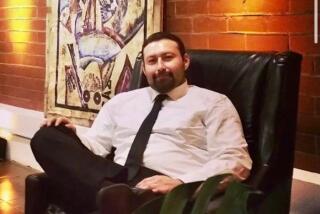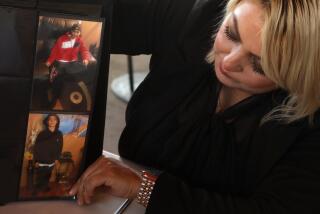Prosecution Witness Pleads No Contest in Murder Case : Courts: The district attorney’s office bargains with the gunman in exchange for testimony against the wife of a slain sex-video producer.
- Share via
The prosecution’s chief witness in the trial of a Woodland Hills woman accused of arranging the murder of her pornographer husband was allowed to plead no contest Tuesday to a reduced charge despite the possibility that he had concocted evidence.
In a bargain with the district attorney’s office, Victor Diaz entered the plea--the legal equivalent of an admission of guilt--to a charge of second-degree murder in San Fernando Superior Court.
Diaz, 47, testified last week that he was a longtime cocaine supplier to the couple and that he fired the shots that killed sex-video producer Theodore J. Snyder on a Northridge street Aug. 1, 1989.
Diaz said he did it at the behest of the victim’s wife, Sharon Snyder, because he loved her and she had promised to share her inheritance with him. Both Diaz and Snyder were charged with first-degree murder.
In return for Diaz’s testimony implicating Snyder, 41, in the murder, the district attorney’s office permitted Diaz to plead to the reduced charge Tuesday and will ask that he be sentenced to prison for 17 years to life, said Deputy Dist. Atty. Lawrence E. Mason.
Without the plea bargain, Diaz could have received the same sentence that Snyder is facing--life in prison without possibility of parole.
Diaz’s two days on the witness stand in Snyder’s trial ended in confusion last week when he said that Snyder had sent him a letter from jail implicating herself in the slaying and pleading with him to “take the whole rap for me.”
The letter, which Mason said he had never heard about, was quickly pronounced to be a fraud by a handwriting expert summoned to court.
The analyst said that neither Snyder nor Diaz wrote the letter, which was postmarked before Diaz made his deal with prosecutors.
Alex R. Kessel, Snyder’s attorney, told reporters that he will prove later in the trial that Diaz “manufactured that letter to make a deal with prosecutors.”
He predicted that because of the fraudulent letter, jurors will find “all of Diaz’s testimony incredible, including his attempt to make my client appear guilty. He’s now a proven fraud who was out to make any deal that will save his skin.”
Mason refused to offer an opinion on what effect the letter might have on the case.
But he said that prosecutors decided to go ahead with the plea bargain “because our expectation of Mr. Diaz was that he would tell the truth in court, and I think he did that.”
Sandi Gibbons, spokeswoman for Dist. Atty. Ira Reiner, would not discuss the Diaz case in detail but said that “telling the truth in court is what we expect and require of anyone with whom we enter into such an agreement.”
Gibbons said there is no policy governing situations where a defendant fails to inform prosecutors about a fact or incident that might ruin his credibility.
“Those kinds of situations would be handled case by case,” Gibbons said, adding that she could recall no such incident in the past.
The hand-printed letter, in which the writer misspells Snyder’s name as “Synder,” asks Diaz to “plead guilty to killing Teddy and say I had nothing to do with it. I promise I will mail you a TV and radio when you are at Folsom as you while the days away. You are young and you be out when your 72 years old, or in the year 2015.”
More to Read
Sign up for Essential California
The most important California stories and recommendations in your inbox every morning.
You may occasionally receive promotional content from the Los Angeles Times.













